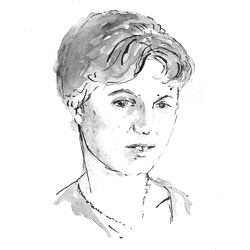Plath’s Tragedy Paper: Journals and Letters
In her journals and letters, Plath leaves a vivid record of her studies at Cambridge. Her impressions of the Tragedy paper reveal, alongside her unique reactions, experiences likely to resonate with current English students. Like today's undergraduates, she reads Sophocles and Racine, and like today's students, she worries about her essays and exams about balancing her reading with her own writing and extracurricular life. Most strikingly, she records her reactions upon encountering memorable passages and texts - some might echo your own and some might surprise you. We have put these together partly as a link between the other two articles in the 'Plath and the Tragedy Paper' section: an analysis of tragic themes in her poetry, and some history of the paper itself. We also hope they might prove stimulating reading for anyone interested in the relationships between reading for pleasure, studying, writing, and life in general!
1. On staying up to read Macbeth:
'... we stayed up till two last night virtuously reading Macbeth. Which was fine. Went awestruck over old speeches: 'tale of sound and fury,' especially.' (Journals, 104.)
The 'tale of sound and fury' refers to Macbeth's speech in Act 5 Scene 5 that begins 'Tomorrow, tomorrow, and tomorrow'. It is indeed a speech to leave a reader awestruck, as Macbeth responds to the death of his wife by considering the meaninglessness of life. The quotation compressed by Plath is: 'It [life] is a tale / Told by an idiot, full of sound and fury, / Signifying nothing.
2. On reading things for the first time:
'There are six exams in all, three required. Of these, two are on composition and criticism (general) and one on Tragedy! This is marvelous for me, because over the next two years I'll be reading tragedy from the classics up to the modern French playwrights, Pirandello, Cocteau, etc., which includes enormous hunks of literature I've never seen before.' (Letters Home, 186.)
'I am making slow progress in the wide fields of my ignorance, going on with French, reading modern tragedy (Strindberg, now), which is sheer delight, and going to study classical tragedy (Aeschylus, Sophocles, and Euripides), which I have, shockingly enough, never touched.' (Letters Home, 209.)
Nowadays there are two required exams - Tragedy and Practical Criticism. Students still tackle this wide range of reading, from the Greeks to contemporary drama.
3. On essays, exams and student stress:
'... it is Saturday afternoon and I have all the academic reading and papers to do which I should have done two days ago...' (Journals, 107.)
'I am taking time early this sunny morning to limber up my stiff fingers in preparation for my Tragedy exam this afternoon and write you so you will know I'm still extant. Just. I have honestly never undergone such physical torture as writing furiously from 6 to 7 hours a day (for the last two days) with my unpracticed pen-hand.' (Letters Home, 314).
'It's disgusting to think that two years of work and excellent, articulate, thoughtful papers should be judged on the basis of these exams and nothing else.' (Letters Home, 315).
'Wednesday, 6 p.m. Tragedy exam all over; very stimulating and fair to make up for yesterday's two horrors.' (Letters Home, 315).
Even though hardly anyone doing Cambridge English writes two exams in a day now, and current students submit coursework essays as well as taking timed papers, it still seems to many that exam papers are a poor reflection of so much reading and thinking. There may be no perfect form of assessment, though. As you'll see in another article, Tragedy exams have the potential to be 'stimulating' as Plath herself found hers in the end.
4. On tragedy beyond the Tragedy paper:
'The constant struggle in mature life, I think, is to accept the necessity of tragedy and conflict, and not to try to escape to some falsely simple solution which does not include these more somber complexities. ... These thoughts are some of the intangibles I've been working out here, in the midst of the outer active, stimulating life. One doesn't get prizes for this increasing awareness, which sometimes comes with an intensity indistinguishable from pain.' (Letters Home, 202.)
Reading tragic literature is often thought to reveal something about life; perhaps these works explore a necessary part of human experience - it can't all be good - and enable us to think about it.
5. On the interplay of reading and writing:
'I am living at the University library from morning to night... enjoying my work, really, steadily reading tragedy now, the Greeks, then on through 2,000 years up to Eliot, concentrating on several major figures: Corneille, Racine, Ibsen, Strindberg, Webster, Marlowe, Tourneur, Yeats, Eliot; there are so many. This tragedy paper (only a 3-hour exam for all that) is a fine help on my reading.' (Letters Home, 308.)
'Why, why, can I not be an for a while, instead of always teetering on the edge of wanting complete solitude for work and reading, and, so much, so much, the gestures of hands and words of other human beings. Well, after this Racine paper, this Ronsard purgatory, this Sophocles, I shall write: letters and prose and poetry, toward the end of the week; I must be till then.' (Journals, 110.)
Very vividly Plath captures the way that reading intensely leads to some kinds of deprivation. Absorbed in her books, she is neglecting life, and her own writing.
Further Reading:
- Sylvia Plath, Letters Home: Correspondence 1950-1963. Selected and Edited with Commentary by Aurelia Schober Plath (London: Faber, 1975)
- Sylvia Plath, The Journals of Sylvia Plath, ed. Ted Hughes (New York: Dial Press, 1982)
